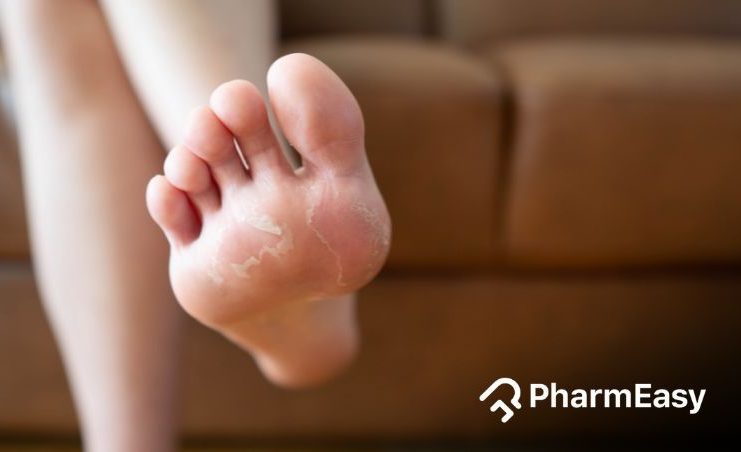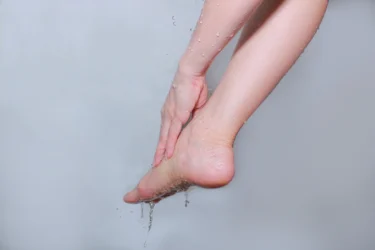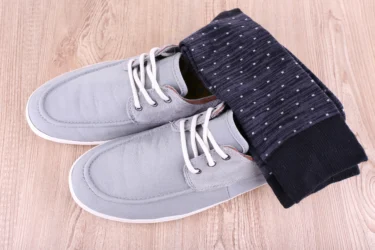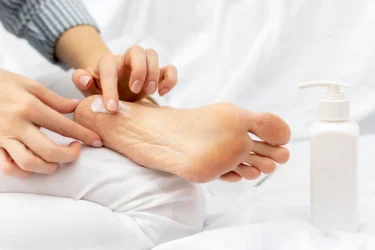Why Do My Feet Sweat So Much: Understanding the Causes and Solutions
By Dr. Shubham Pandey +2 more

Get,

to manage your symptom
Get your,


4 Cr+ families
benefitted

OTP sent to 9988776655



You’ve successfully subscribed to receive
doctor-approved tips on
Whatsapp

Get ready to feel your best.

Hi There,
Download the PharmEasy App now!!


Register to Avail the Offer
Send OTPBy continuing, you agree with our Privacy Policy and Terms and Conditions

Hi There,
Sign up on PharmEasy now!!
Trusted by 4 crore+ families

OTP sent to 9988776655



You have unlocked 25% off on medicines




Code: NU25
By Dr. Shubham Pandey +2 more
Table of Contents
Having sweaty feet can be quite a bother. At some point, we’ve all dealt with damp socks in our shoes. But why exactly do we get sweaty feet? And what can you do about it? In this post, we’ll delve into the causes of excessive sweating on feet and also explore ways to control it.

Hyperhidrosis means excessive sweating in various parts of the body. It may lead to excessive secretion of sweat, more than usual, either in a single part or more than one part of the body. This excess sweat may affect the skin of areas like the palm, feet, face, scalp, and axillae1. The cause(s) of hyperhidrosis is often unclear. Certain factors like underlying medical conditions and medicines might play a role in it2.
Sweat glands help keep our bodies cool and are present in feet. Sometimes people may have overly active sweat glands secreting sweat more than normal, which may cause both physical discomfort and emotional unstability3.
Reproductive hormones also plays a vital role in maintaining body temperature. Estrogen helps in reducing the body temperature by increasing sweating4. However, deficiency of estrogen especially in menopausal women often causes sweating. So, hormonal changes may sometimes increase sweat on various parts of the body, including the feet1.
Stress, anxiety, pain and fear also play a part in maintaining body temperature. They may also increase sweat production because of “fight or flight” response. This increases your heart rate, blood pressure, and breathing and activates your sweat glands. This includes the sweat glands in your feet5.
Even shoe material like leather play a vital role in excessive sweating, as leather’s water vapor permeability is 1/200th when compare to clothing material. In addition, wearing tight fitting shoe for may lead to change in microclimate around the foot and cause excessive sweating6.
Some medications may also lead to sweating in foot. These include antidepressants, antiemetics, anticholinesterases/ cholinergics, antidiabetic agents, antipyretics, alcohol, antineoplastics, anxiolytics, antipsychotics, and opiates.
Excessive sweating in the foot may also be caused by conditions like cancer, genetics, sweat gland autonomic condition or may be present from the brith7.
To my knowledge, sweaty feet in teenagers and younger adults are most often the result of hyperactive sweat glands that are triggered by fluctuating hormone levels in the body. Mental and emotional stress is a typical cause because the sweat glands on the palms and soles react primarily to emotions14.
Dr. Rajeev Singh, BAMS
If your feet often feel wet, cold or leave wet prints on the floor, this is one clear symptom. Most likely, you may have hyperhidrosis of the feet or excessive sweating due to other causes8.
If your feet feel slipping away from your footwear. this is another sign of excessive foot sweat. It’s often accompanied by the constant moistness mentioned earlier8.
Too much foot sweat may result in an unwanted side effect, which is stinky feet. Excessive sweat is broken down by the bacteria on your skin, which causes your feet to smell bad7.
Sweat can cause itching if it remains trapped in socks or shoes. It can create a moist environment that promotes fungal growth or irritation.
Too much foot sweat may also make your foot prone to fungal, viral, and bacterial infections. These include some forms of tinea and verruca infections and pitted keratosis. Damp places are perfect for fungi, virus and bacteria to grow, making these types of problems more common7.
In my opinion, to help you manage your symptoms, a dermatologist or healthcare expert may assist you in determining the best course of action15.
Dr. Siddharth Gupta, BAMS MD (Ayu)
As mentioned, your feet may sweat too much for various reasons. But when should you consider seeing a health expert? Let’s understand this now.
Thankfully, there are several ways to avoid and manage foot sweat. These range from personal care measures to medical options.

Taking good care of your feet is key to reducing foot sweat and other issues like infections. Some practical tips to help keep your feet clean and dry are as follows11.

Choosing the right socks and shoes may play a major role in controlling foot sweat. Here are some tips to reduce foot sweat.

Beyond good foot care and the right footwear, there are home fixes and life changes that may help keep foot sweat under control. These are as follows.

For severe cases of foot sweat or when home remedies are not enough, there are medical options that may help. These are always used/done under the guidance of a healthcare professional. These include:
Dealing with sweaty feet can be hard. However, knowing what causes of foot sweat may help you tackle this issue.
By taking good care of your feet, choosing the right socks and shoes and using antiperspirants, you may be able to reduce foot sweat. Doing this will boost your comfort and confidence in your day-to-day life. Also, there are medical procedures available if needed for dealing with sweaty feet, and a healthcare professional can guide you best about your need. So always keep them in the loop before incorporating any type of management methods into your daily routine.
First, identify what might be causing your feet to sweat a lot. Then take the right foot care, wear suitable socks and shoes and try lifestyle changes or consult your doctor for medical options to reduce your foot sweat.
Foot sweat alone doesn’t always mean you’re ill if you’re worried or have other symptoms, consult your healthcare provider for a check-up.
Your feet may sweat when cold due to a condition called cold-induced sweating syndrome or chilblains. This phenomenon occurs as a result of abnormal responses in the autonomic nervous system, leading to sweating even in cold temperatures.
Your feet may sweat without socks due to several reasons, including increased friction and lack of absorption of moisture, leading to accumulation of sweat. Additionally, sweat glands in the feet are highly concentrated, and wearing socks helps absorb moisture and reduce sweat.
Excessive sweating of the feet at night, known as nocturnal hyperhidrosis, can be caused by various factors such as hormonal changes, anxiety, or medical conditions like hyperthyroidism. It’s important to consult a healthcare professional to determine the underlying cause and explore appropriate treatment options.
Yes, it is normal for babies’ feet to sweat. Babies have more sweat glands compared to adults, and their feet can sweat due to factors like heat, activity, or being bundled up in warm clothing. Ensure they are dressed appropriately for the temperature to avoid overheating.
Yellowish sweat on the feet can be due to a combination of factors, including sweat mixing with natural oils from the skin and bacteria. This mixture can cause discoloration, particularly in areas where sweat tends to accumulate, such as the feet. Keeping feet clean and dry, and wearing moisture-wicking socks can help manage this issue.
Sweaty feet can be a symptom of diabetes, especially when paired with other signs like increased thirst, frequent urination, and blurred vision. It can indicate nerve damage (neuropathy) or poor blood circulation (peripheral artery disease), both common in diabetes. Consulting a healthcare professional for proper diagnosis and management is essential.
Yes, antibiotics can occasionally cause sweating as a side effect. Some antibiotics, particularly those that affect the nervous system or hormonal balance, may lead to increased sweating, including on the feet. If excessive sweating persists or becomes bothersome, consult your healthcare provider for guidance.
Yes, sweat can contribute to blisters on the feet, especially when combined with friction from shoes or prolonged activity. Excessive moisture softens the skin, making it more susceptible to frictional forces that lead to blister formation. Properly fitting shoes and moisture-wicking socks can help prevent this.
Disclaimer: The information provided here is for educational/awareness purposes only and is not intended to be a substitute for medical treatment by a healthcare professional and should not be relied upon to diagnose or treat any medical condition. The reader should consult a registered medical practitioner to determine the appropriateness of the information and before consuming any medication. PharmEasy does not provide any guarantee or warranty (express or implied) regarding the accuracy, adequacy, completeness, legality, reliability or usefulness of the information; and disclaims any liability arising thereof.
Links and product recommendations in the information provided here are advertisements of third-party products available on the website. PharmEasy does not make any representation on the accuracy or suitability of such products/services. Advertisements do not influence the editorial decisions or content. The information in this blog is subject to change without notice. The authors and administrators reserve the right to modify, add, or remove content without notification. It is your responsibility to review this disclaimer regularly for any changes.
Comments

Leave your comment...
You may also like
Comments